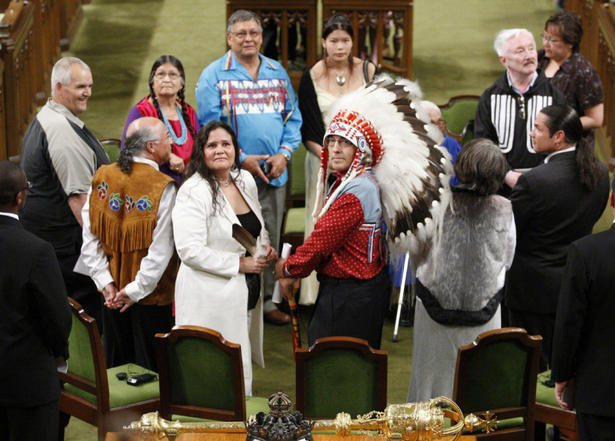Truth Commission Goes to Court to Get Government Documents
By Colin Perkel
Years of mounting frustration over access to government records has prompted the commission of inquiry into Canada’s residential school system to turn to the courts for help, The Canadian Press has learned. In court filings, the Truth and Reconciliation Commission accuses Ottawa of stymying requests for documents the inquiry says are vital to its core mandate: “delivery on truth, reconciliation and ultimately healing.” Documents filed with the Ontario Superior Court of Justice show the commission worries that Ottawa’s alleged intransigence will make it impossible to complete its work as required by July 1, 2014 and within budget. “If the parties, through incompetence, delays or deliberate stonewalling (or a combination thereof) sabotage the work of the commission, then Canadians are certain to forget (and never fully learn) what has happened,” the commission’s factum states. The application asks the court to clarify the government’s obligations under a settlement with victims of the Indian residential school system that set up the commission led by Justice Murray Sinclair. “The commission is taking this step very reluctantly and with a sense that it has been left with no alternative,” Sinclair said in a statement. Under the agreement, the government of Canada and churches are obliged to provide all “relevant documents in their possession or control” to the commission. Court filings show years of government squabbling over the word “relevant.” The government maintains it has done its best to co-operate, providing 1 million documents already. A spokesman for Aboriginal Affairs Minister John Duncan said the government was “committed to bringing closure” to the legacy of residential schools. “Canada aims to disclose all of its remaining documents relevant to the TRCs mandate by June 30, 2013,” Jan O’Driscoll said in a statement Monday. The commission says it would cost far more than its entire $60-million budget if it is forced to find and digitally organize the materials still in federal archives by itself. “What is at stake here is control over history,” lawyer Julian Falconer, who represents the commission, said over the weekend. The Superior Court has set aside two days later this month for Stephen Goudge, a justice with the Ontario Court of Appeal, to hear the case. The residential school system, which ran from the 1870s until the 1990s, saw about 150,000 native kids taken from their families and sent to church-run schools under a deliberate policy of “civilizing” First Nations. Many students were physically, mentally and sexually abused. Some committed suicide. Mortality rates reached 50 per cent at some schools. In the 1990s, thousands of victims sued the churches that ran the schools and the Canadian government. Following settlement of the suit, Prime Minister Stephen Harper issued a historic apology in June 2008. “There is no place in Canada for the attitudes that inspired the Indian residential schools system to ever prevail again,” Harper said. “You have been working on recovering from this experience for a long time, and in a very real sense we are now joining you on this journey.” The $1.9-billion settlement also led to the creation of the Truth and Reconciliation Commission to research what had occurred and to make recommendations. Part of the commission’s mandate is to help in a process of reconciliation, while yet another is the “creation of a legacy” that includes collection of records, taking statements from those involved, and classifying and preserving the materials. A national research centre was also to be set up as a permanent archive. Affidavits filed in support of the application show the government only started providing the material — an initial 38,000 documents — in April 2010. However, it took until November 2011 — about six years after Ottawa first signed the settlement in principle — for the government to hand over the bulk of what’s been provided so far. In an interim report issued in February, Sinclair took the government to task for its lack of co-operation — to little effect. “This is a court-ordered settlement and it seems odd that the commission now has to go to the courts to get access,” said Jean Crowder, New Democrat aboriginal affairs critic. “Why is the government afraid of letting a little sun shine on our history?”
|
.
Any original material on these pages is copyright © BishopAccountability.org 2004. Reproduce freely with attribution.
